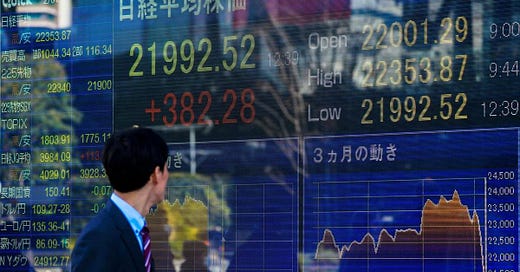Emerging Markets Daily - February 16
EM Inflation Opportunties, Turkish Lira Sizzles, Credit Suisse Upgrades India, Foreign Companies and Saudi Arabia, UAE Gov't Entity Accepts Crypto
The Top 5 Emerging Markets Stories - February 16
Finding Value in an EM Inflationary World: Bank of America
“With global demand returning and supply bottlenecks likely to drive up shipping, food and energy prices, Bank of America believes emerging market inflation could be on the horizon. In a note distributed Sunday, EEMEA Cross Asset Strategist David Hauner highlighted that while markets are pricing in the highest U.S. inflation for a decade, emerging market expectations are not following suit, despite being typically more inflation-prone than developed markets.”
“A first sign that an inflation bump could be imminent in emerging markets, Hauner said, was the recent spike in freight rates, as a global trade resurgence and capacity constraints among carriers cause supply bottlenecks. BofA analysts also expect oil prices to double versus 2020 and note that food prices are accelerating.”
“Hauner recommended buying currencies backed by hawkish central banks or a robust balance of payments — namely the Brazilian real, Chinese yuan, Czech koruna and South Korean won — along with oil exporters, most notably the Russian rouble and Russian equities.”
“‘Among EM countries, an environment of rising inflation and rates favors markets that are resilient against higher funding costs and in fact benefit from rising commodities,’ Hauner said. ‘This includes Russia, Saudi Arabia or the United Arab Emirates (UAE), for example. We like Russia in equities and FX, and Dubai in equities.’” CNBC reports.
Turkish Lira Sizzles, Turning Wall Street Analysts Into Bulls
“The Turkish lira’s hot start to 2021 is even winning over some skeptics who are betting on further gains in the months ahead. The currency has jumped a world-leading 23% against the dollar since President Recep Tayyip Erdogan overhauled his economic policy team in early November. That shakeup buoyed investor optimism that Ankara would take a more orthodox approach to managing one of the Middle East’s largest economies.”
“Analysts at Societe Generale SA and HSBC Holdings Plc predict the advance isn’t over just yet. They say the lira will rally to 6.5 per dollar by year-end, signifying a 7% increase from its current level. The thinking is that Turkey’s dwindling foreign-exchange reserves may dissuade Erdogan from intervening on monetary policy for now. Recent interest-rate hikes and the prospect of inflation remaining in the double digits add to their bullish backdrop.” Bloomberg reports
Credit Suisse Upgrades India to Overweight
“The sharp turnaround in the economy coupled with a drop in Covid cases over the past few weeks has led Credit Suisse to upgrade its stance on India to ‘overweight’ in its Asia pacific (APAC) model portfolio. India, it believes, looks much better positioned cyclically and relative to the pandemic.”
“‘India suffered a severe outbreak but has seen a dramatic drop in infections, likely due at least in part to achievement of herd immunity in some locations. Earnings per share (EPS) momentum is among the regions’ strongest. Its credit cycle is at an earlier stage than perhaps all other APAC markets. The scope for rate cuts is greater than in perhaps every other market save Indonesia,’ wrote Dan Fineman, co-head of equity strategy for Asia Pacific at Credit Suisse in a February 16 note.”
“Within Asia Pacific (ex-Japan), Credit Suisse is now biased towards second-phase Covid recovery markets—Korea, India, Australia, Singapore, and Hong Kong— and away from the early recovery markets (China and Taiwan) and the late-recovery markets in Asean.”
“Among other regions, Credit Suisse has downgraded China from 'Overweight' to 'Market Weight' in an APAC portfolio as it feels the most exciting period of its recovery has passed,” Business Standard reports
Foreign Companies Pushed to Move Regional HQs to Saudi Arabia
“Saudi Arabia will stop doing business with foreign companies with regional headquarters outside the kingdom starting in 2024, state media said Monday, in a move aimed at boosting investment as unemployment soars.”
“The bold announcement could intensify competition between the kingdom and other Gulf petro-states, including its principle ally the United Arab Emirates, for foreign capital as they reel from an economic downturn.”
“Under a previous government initiative known as "Programme HQ", Saudi Arabia had offered multi-national companies tax breaks and incentives to relocate their Middle East headquarters to the kingdom.”
“Many multinationals doing business in the conservative kingdom prefer to have their headquarters in the neighbouring United Arab Emirates and other Gulf capitals that offer a relatively more liberal lifestyle and permit alcohol.” France24 reports
UAE Government Entity To Accept Crypto As Payment
“KIKLABB announced on Tuesday that it has become the first government-owned licensing entity in the UAE to accept cryptocurrency as payment. The Dubai Government-owned company said that cryptocurrencies, including Bitcoin, Ethereum and Tether (USDt), can now be used to pay for trade licences and visa fees in a move designed to encourage entrepreneurs to set-up and scale-up in the UAE.”
“The UAE is already a leader in the adoption of blockchain with a national strategy in place and the aim to conduct 50 percent of government transactions using the payment technology by 2021. In addition, the Dubai Future Foundation estimates that the UAE could save over $3bn simply by implementing advanced blockchain technologies.”
“Research from DMCC's Future of Trade report found that blockchain could help reduce up to 20 percent of the physical paper costs associated with global trade, currently estimated at $1.8 trillion.” Arabian Business reports



